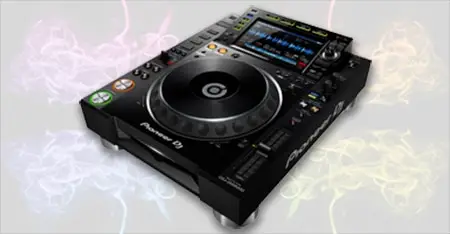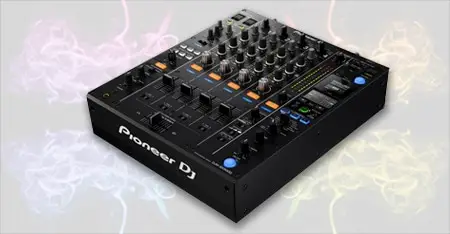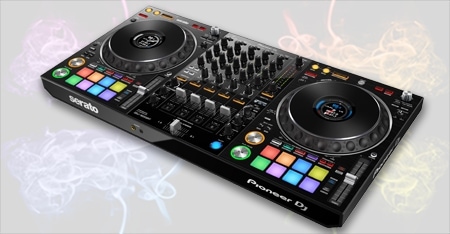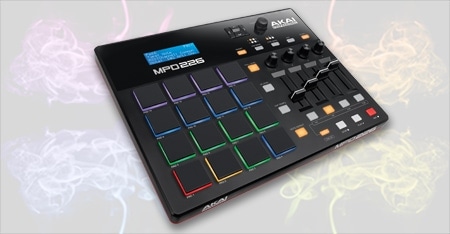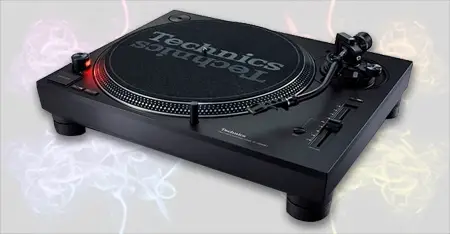
You would often hear these two terms used interchangeably in the dance music world but they aren’t the same. What exactly is the difference between DJ and producer?
In short, a producer is someone who makes the music. While a DJ is someone who plays the music to the crowd. Although often an artist will be both, most of the superstars certainly are.
But of course, the answer is much more nuanced than that. So let’s dive in to give you a full understanding of the roles and the skills of each.
Producers
Contents
As with everything in life, there is not really a straightforward answer without giving some caveats too.
As with everything in life the true answer to what is a producer requires an in-depth explanation as there are a couple of different types.
To make the explanation easier I have broken these out separately.
Producers: Dance Music / EDM
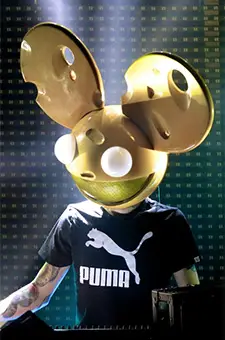
A producer for dance music is someone that creates music mostly from scratch in a studio. In days gone past this would have been a dedicated studio full of hardware. However, now with everything being software and computer-based, producers can work at home or on the road.
A producer of this kind will either use tweaked samples or even create their own sounds from scratch. This enables them to create unique music in their own style.
Some of the most famous producers at the moment include people like Skrillex (see his amazing setup here), Deadmau5 (see his amazing setup here) or Diplo. Whether you consider these good producers or not is a matter of personal opinion.
Remixing Is Still Producing
A producer does not necessarily always have to produce 100% original work. They can remix other people’s work and still be a producer.
When remixing the producer will be provided with the broken down, individual audio files that make up a track. For example, they will receive a file for vocals, separate from the drums, which is separate from the bassline, etc. This allows them to use as much, or as little, of the original track as they like. They then add as many elements of their own to create a new remix.
Some producers become very well known for remixes, alongside their own productions. Kissy Sell Out, for example, produced nearly 1000 unofficial remixes that have become legendary in the dance scene.
Although, generally, producers will spend most of their time producing original material, alongside remixes. These will be for an official release, to use in their own DJ sets or occasionally, to release for free online.
Producers: For Bands
When a band, or live act, go into the studio they require a producer to help them construct tracks.
Essentially, the producer is someone who will take the tracks that the band has written and help record them. In essence, also acting as a technician or engineer. They will then add extra elements to make the sound cohesive.

While the band themselves will ultimately retain control, it is the producer’s job to know the equipment and recording software inside out, so that they can help realize any ideas that the band themselves have.
Working in this way allows the band to focus on songwriting and mastering their instruments, as opposed to having to learn software techniques as well.
A great example of a highly produced album would be TOOL’s Lateralis. Here, the band would have recorded the guitar, bass, drums, and vocals. A producer would have then taken those audio files (called stems) and turned them into the final product.
At a simplistic level, this involves setting the volumes through to adding subtle effects. A prime example on Lateralus is the phaser effects on the drum’s high hats. These would have been added by the producer as opposed to the band themselves during recording. This would all have been done under the band’s supervision of course.
So, in this case, the producer is less about creating original music themselves, but rather adding elements to music created by a band.
Many bands work with the same producers throughout their careers. In fact, you often hear them referred to them as an additional member of the band. George Martin, for example, is often referred to as the fifth Beatle due to his studio work with them. In this instance the difference between DJ and producer is huge.
DJs
As with producers, there are a couple of types of DJs, however, the broad definition remains the same.
DJs are someone that takes pre-recorded, i.e produced music and plays it out in front of an audience.
Their skills lie in mixing tracks together, as well as reading a crowd and selecting music to make the audience have the best time possible.
At the basic level, all DJs are generally playing other people’s produced music. What varies between the types of DJs is how they play that music.
Club DJs
Club DJs focus a lot on finding new music, as well as learning technical mixing skills. This allows them to match the speed of tracks so that the music flows constantly and people can keep dancing even as one song changes to the next.
Mobile DJs
These tend to be the ones that play weddings and corporate events. They are much more about pleasing the crowd with classic, even cheesy, music than they are about technical skills.
This means they are less concerned with beat matching than they are with playing a wide variety of styles. They focus on having large music libraries so, whichever audience they are playing to, they have relevant music available to keep them happy.
Weddings are prime examples of this, as you have a large range of ages and tastes that you need to cater to all at the same time.
Love DJ gear?
So do we, check out our favorites…
DJ / Producer
Now all of the above said, of course, you do have artists that crossover into both DJ and producer territory. In fact, these are arguably the most common type of artists.
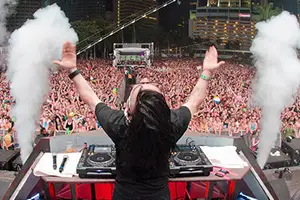
Most DJs that you see touring will have had at least some original releases out. Meaning there is not a huge difference between DJ and producer in this case.
The main reason for this is, it is easier/quicker to become known through your own music, and then get DJing gigs than it is to become known for DJing alone.
This is because there are a lot of DJs creating mixes and putting them online. Whereas good producers who release new unique styles are bringing something fresh and exciting to people. This helps them to stand out and become known.
This is what happened with Skrillex (see his amazing setup here) when he produced tracks and put them online for free. It was unlike anything else at the time which caused people to share them, a lot. Ultimately this is what led to him being signed to Mau5trap and his explosive success.
Can a DJ Be a Producer?
In short, yes absolutely and actually, a lot of the skills are complementary between DJ and producer.

For example, both have to mix music i.e tweak the highs, mids, and lows to make sure it sounds as good as it can. In a simplified sense, the difference here is merely a technicality. A producer will mix the various stems within a single track to make it sound cohesive. While a DJ will be tweaking two tracks to merge them and create a cohesive blend.
That’s not to say that a producer can walk straight into a DJ booth and perform or vice-versa. That a DJ can walk into a studio and start making tracks immediately. There are unique skills required for each.
The producer needs to know how to use the software to create sounds from scratch. While also having at least some music theory knowledge to play things like synths or program basslines.
Likewise, a DJ needs to learn how to beat match to transition smoothly from one track to another. A form of beat matching is also done production and is called time stretching. It is largely automated in the studio whereas the DJ should know how to do it by ear.
In short, the DJ/Producer is someone that makes their own music and is then able to go and play it out in front of an audience as a DJ. So although the lines of the difference between DJ and producer are blurred here, it comes down to making unique music.
During a set DJs can use things like loops, effects and sometimes even play extra instruments on top of a track. However, they are not creating the music from scratch. They are instead adding to an existing track.
Live Electronic Acts
The variation of the DJ/producer explanation would be some electronic live acts.
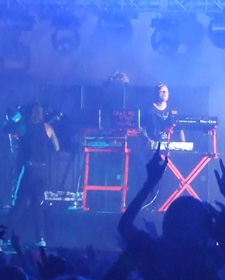
An example of this would be The Prodigy. While they perform live as a band, they actually write their music electronically.
When they’ve done their studio work, they then work backward to be able to play the tracks live using instruments.
A very good example of artists crossing all three, producers, DJs and live act would be Chase & Status.
For a long time, they produced their own music and played it out by DJing. When their popularity exploded they incorporated live drums and guitar, and started touring as a live act.
But in their case, it all began with producing their own music.
Is it Necessary for a DJ to Know How to Produce?
No, not at all. Although many DJs will have, at least, a basic understanding, they do not need to know how to make the music.
Instead, they learn how to mix music in general. This means they can take tracks that they have literally never heard before and then mix them together.
This is, in part, because they understand the rules around how tracks are constructed. For example, dance music is built around four beats in a bar, and sections of eight bars.
Once that is understood, a DJ can easily mix any track built around that framework. Without needing to know how to use the software that made it all possible. So the difference between DJ and producer, in this case, is that the DJ only knows the basics.
That said, it is becoming increasingly rare to have DJs who don’t produce. Even those that may start solely as a DJ, eventually move on to production at some point in their career. Whether as part of a collaborative effort or by learning the processes themselves.
This is because, as mentioned above, it is easier to establish yourself as a global artist through your music, than it is through DJing skills alone.
Perhaps the Exception to This Would Be Turntablists
Artists like DJ Qbert have perfected (and created) so many techniques on turntables that they are famous for it. Audiences will go and see them live to watch them flex their skills on the decks (see our recommended vinyl decks here).
That said even DJ Qbert has produced tracks of his own. As many turntablists do. Doing production does help raise your profile but it’s not essential in all cases.
The Difference Between DJ and Producer and Live Act Is a Blurry Line
All of the above said it is fairly common for an artist to be doing all three on stage at once.
Skrillex (see his amazing setup here) is a great example of this. An established producer, while on stage, he will often be DJing while also using synths or drum pads to play live and construct a track live. Which, when you are making your own music, is, by definition, producing.
So, while there are very clear distinctions in the definitions, these days all three will often be rolled into one artist.
This makes sense as all skills from each discipline are complementary to each other. As you begin to learn one area, so the others make more sense and their learning curve is shortened.
Are Different Qualifications Required?
In essence, no qualifications are required for either profession, DJ or producer. Especially these days, most DJ and producers are self-taught, again like Skrillex for example.
That said, of the two professions, producers are more likely to have some kind of formalized education. This is perhaps more true for studio/band producers.
This is because they have to learn in-depth about music and sonic theory, as well as equipment set up and use. All of which helps them to be able to steer and guide studio sessions.
Studio time is hugely expensive so record labels are keen to have bands in as short a time as possible. Therefore a producer must know the processes inside out to ensure the recording goes as quickly as it can.
Of course, there will be studio producers with no formalized training, in which case they will have just spent time learning through experience. Perhaps by completing an internship with a studio
Conclusion: What Is the Difference Between DJ and Producer?
As you’ve read above the answer to the difference between DJ and Producer is fairly nuanced. While making unique music defines a producer, the fact that DJs often do this live means they are technically both.
So, to answer this on an individual basis, you will need to know if an artist is playing their own music and if they are using decks (see our recommended decks here) or constructing it live. Then, using the info described above, you will be able to make up your own mind on how to describe them.
If you still have questions or your own input about the above, then drop them in the comments!
FAQs: What Is the Difference Between DJ and Producer?
What is the difference between a DJ set and live?
There is a huge difference between a DJ set and a live set although often there is also a lot of crossovers. Generally, when you see a DJ set, the DJ will be playing pre-recorded tracks and selecting them based on what the crowd is responding best to. They will then beatmatch and mix the tracks together to create a seamless flow of music that keeps the crowd dancing. Most of the time a DJ will not be playing any instruments or creating any of the music from scratch and this is the main difference between the two.
In a live set, an artist will be using instruments, whether that is traditional instruments or hardware such as synths and drum machines. They will be creating the music on the spot. The ways in which an artist creates the music does vary, even when using electronic equipment it can still be considered ‘live’. The Chemical Brothers, for example, use many bits of hardware on stage and build up their tracks piece by piece.
So although it sounds like a continuous stream of music, similar to a DJ set, because they are creating those sounds and the music from scratch, then it is considered a live set.
However many DJs do a hybrid of both. So while they might have a traditional setup of decks and a mixer they may also have some form of instrument alongside. Whether this is a traditional instrument, like a guitar, or an electronic instrument like a synthesizer or similar.
The key difference between a DJ set and a live set is whether the music being played has been pre-produced or whether it is being created from scratch on the spot.
Do DJs create mixes live?
Yes, for the most part, DJ’s will be creating their mixes on the fly in front of you. Although it is known for DJ’s to pre-record sets this is actually exceedingly rare and isn’t considered true DJing. A true DJ will be watching the crowd to see what they are reacting to and then selecting tracks that keep the vibe good and the crowd happy and dancing.
There are two key skills that go into being a successful DJ. Being able to read a crowd is one and the second being mixing ability. These are the technical skills that a DJ needs in order to mix the selected tracks in a seamless, creative way that makes the music flow continuously. The most successful mixes are when the crowd almost do not notice that the transition between two different tracks is happening until the main hook or bassline of the next track kicks in.
The only time that DJs will pre-record mixes and then play them at shows is either when they do not have confidence in their own ability to mix live. Or if they have visuals that they are matching, in which case, the timing of the tracks being played needs to be exact.
Why do DJs turn knobs?
There are many controls and knobs on both DJ mixers (see our recommended mixer here) and DJ decks (our recommended decks). These all do different functions, nearly all of them to do with manipulating the audio being played.
The two main cases where you will see a DJ turning knobs is to change EQ and effects. EQ (meaning equalizer) is a broad term for the ability to manipulate different frequencies of the audio. A DJ is able to independently control the high, mid and bass of a track and turn the volume of each up and down.
Highs cover the main melody of a track, for example, the vocal lines or lead guitar. The mids are the main ‘body’ of the music containing a balance of the entire track including all instruments. While the bass allows you to control the bassline and also reduce the power of the kick drums.
Manipulating the EQ is how DJs are able to merge two tracks together. For example, turning the high up on one track would make a vocal line stand out clearly while they could turn up the bass on the second track thereby creating a live remix on-the-fly.
The other area where you will see DJ’s turning knobs is to control FX, this can be things like echo or filters. These can be used either when tracks are being mixed, to add an extra layer to the blending, or sometimes you will hear a DJ adding effects to a track that’s playing by itself.
There are other knobs on DJ equipment and they cover everything from the volume of individual tracks through to a DJ being able to scroll through their list of tracks to select the next one. In short, DJs turn knobs to both select the features and tracks that they want to play, as well as, manipulating audio while it is being played.
Can a DJ play any song?
Generally yes a DJ can play any song they wish, yet there are a couple of things that they must take into consideration.
One is the event or the genre that they are playing. For example, if they are playing a Techno gig then it may not really make sense to play commercial pop music. That said, they may be creating a live mashup or remix i.e mixing commercial music with a Techno track so it still is in keeping with the theme of the event yet while creating a remix on the fly.
The other consideration is copyright restrictions. Generally, when playing in a club, the venue itself will have a music license, therefore any copyrighted music played by the DJ is covered under it. So, generally, DJ’s tend not to worry about this aspect. Assuming of course that they have purchased their music legally in the first place.
So yes, in short DJs can play any song that they feel is in keeping with their set and the mood that they are trying to create.
What next?
- Want to know what DJs actually do on stage? Find the answer here.
- Ever wondered what defines a mobile DJ? Then this is the guide for you.
Sources
- George Martin image by Adamsharpe, licensed under CC 3.0
- Deadmau5 image by Deadmau5 😀, licensed under CC 3.0
- Skrillex image by Rob215, licensed under CC 2.0

